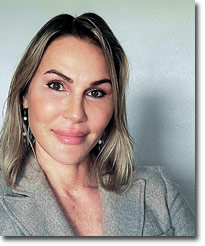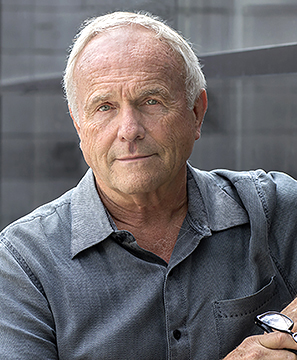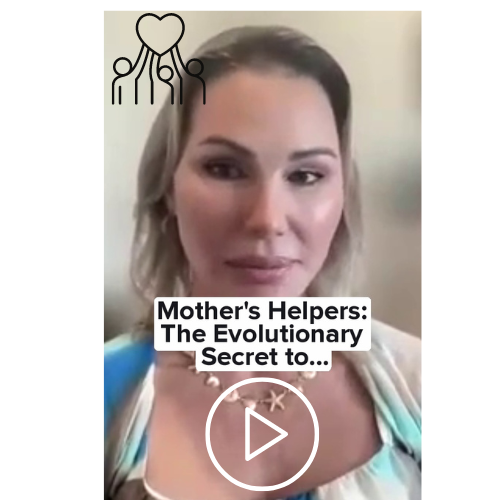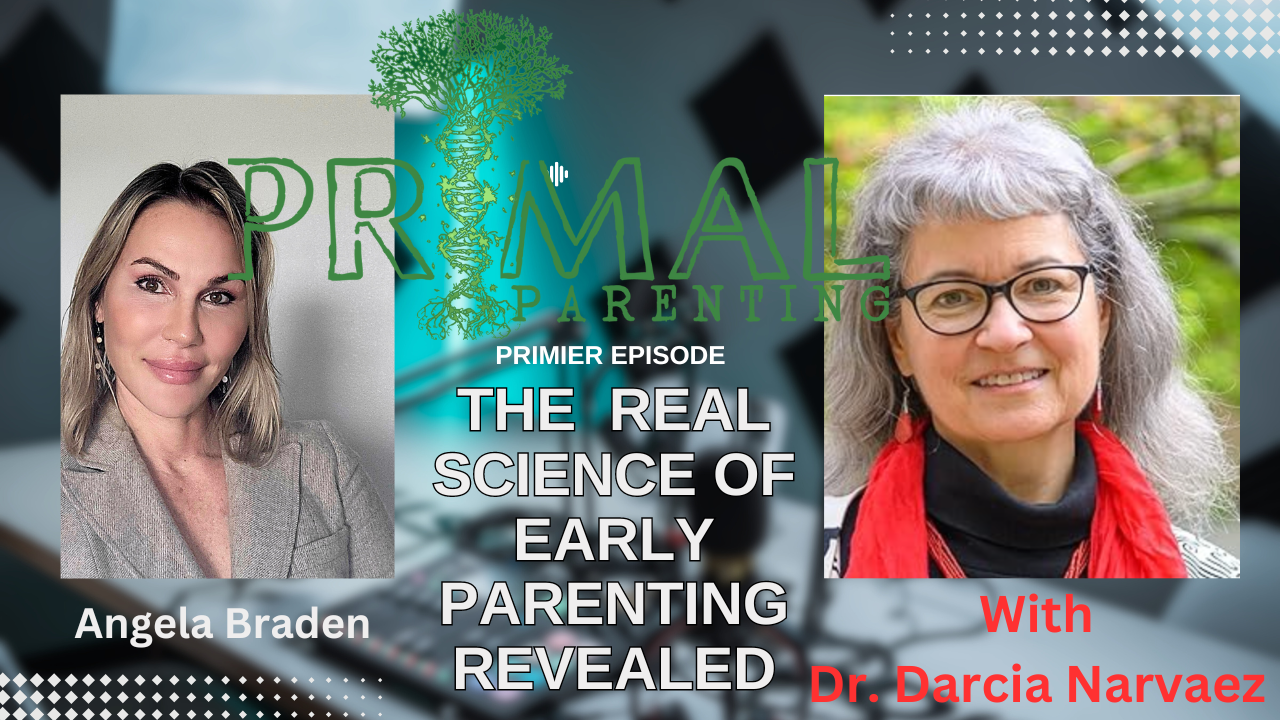
Angela Braden, EFTMP, has assumed the role of Director of Touch the Future, Inc. She brings a powerful blend of journalistic depth, emotional intelligence, and practical expertise that aligns seamlessly with Touch the Future’s founding mission. She is a career journalist and author of Primal Parenting: The Ancient Antidote to the Current Children’s Mental Health Crisis, a certified Emotional Freedom Technique Master Practitioner, and the founder of Primal Psychology.
As the host and producer of The Primal Parenting Podcast, which has operated under the Touch the Future banner this past year, Angela carries forward a movement rooted in human attachment and biological wisdom. The podcast builds on the TTF library of child development and explores how ancient principles and child development merge. She shows how ‘real science’ guides modern parents in raising emotionally resilient and thriving children.
Angela served as an editor with Children’s Health Defense, under Robert F. Kennedy, Jr., and with Moms Across America. She is also the creator of the Smart Baby Sleep System, a practical guide to optimize baby sleep based on brain science and avoid the trauma of cry-it-out sleep training.
“It’s my deepest honor to continue Michaels leadership, shaping the foundation of what it means to honor the ‘child,’ as our greatest teacher. His five decades of curating and preserving the wisdom of the world’s most brilliant minds in child development is a treasure for humanity.”
Angela’s vision is clear: to amplify the work of Touch the Future and its historic archive, and expand the reach of our messaging to meet the urgent needs of today’s children. Under her leadership, Touch the Future will not only preserve the foundation we’ve built but also translate it into the contemporary world — where parents, educators, and communities are searching for ways to restore connection, compassion, and authentic human development.

Michael Mendizza, Filmmaker and the Founder of Touch the Future.
Prompted by the attempted rape and murder of a female colleague in 1981, Michael embarked on The Betrayal of Intimacy, an independent research and public awareness project to prevent sexual violence. The sociopath, rapist, and abusive male are most often themselves victims of early childhood abuse, humiliation, and neglect. It is this betrayal of intimacy that creates a foundation for violence. If the absence of nurturing is a major contributor to juvenal and adult patterns of violence, then feeling safe, physical affection and play in early childhood will help prevent violence. In 1987 Michael founded Touch the Future, a nonprofit learning design center, upon this simple observation.
As documentary filmmaker Michael has traveled extensively researching sensitive issues: domestic violence and rape, the impact of media on learning, cultural and human development, the nature of intelligence, holistic learning models, the changing family, prenatal learning, creativity and peak performance. For two decades Michael has gathered and published interviews with more than fifty researchers, scientists, authors and performance specialists, including extensive works with renowned physicist David Bohm, J. Krishnamurti, Ashley Montagu and Joseph Chilton Pearce. Working closely with Pearce and performance specialists, Michael developed a revolutionary parenting and coaching model that applies the psychology of optimum experience, what athletes call The Zone, to parenting and to education, developed in Magical Parent – Magical Child, the Optimum Learning Relationship. offers this model of peak performance and optimum learning to parents, preschool, Head Start, and childcare providers, public educators and amateur athletic coaches.
Michael has presented these and related works at national and international conferences in the United States, Eastern Europe, The Netherlands, in India and the United Kingdom. Other publications include: “Practical Wisdom,” a bonding and attunement guide for parents during the first two years. “The Life and Insights of Joseph Chilton Pearce,” a survey of themes Joe developed in seven of his most revolutionary books. “Unconditionally Free,” perhaps the most comprehensive overview of J. Krishnamurti’ life and insights. Always Awakening Buddha’s Realization Krishnamurti’s Insight, a five-year dialogue with Samdhong Rinpoche.
Mission & Objective
Athletes call it the Zone, researchers call it Flow, children call it Play. Our mission is to help adults, parents, educators, childcare providers and amateur athletic coaches rediscover this Optimum Learning Relationship and apply it to parenting and to education. Our objective is to optimize learning, performance and well-being by cultivating an awareness of the way “states of relationship” impact human development, at any age, in any field. We accomplish this by designing and developing appropriate learning opportunities which target the needs of different populations. Our goal is to bring about a deep change in the way adults view and relate to the developmental needs of children. Change adult perceptions and behaviors and all of childhood changes with it. Focus only on the child and we remain right where we are.
Background & A Little Science
Why is focusing on the adult so critical? Maria Montessori described the “absorbent mind” of the early child. Jean Piaget noted that the life of young children is defined by an “unquestioned acceptance of the given”. Learning is “state specific.” By state we mean relationship. It is the actual “relationship” with primary caregivers that is accepted and remembered by the early child, without the benefit, or interference, of conscious discrimination.
Recent studies of developmental brainwave activity reveal that before birth and through the first five years of life, the infant/child’s brain is generating primarily DELTA and THETA states of awareness, similar to a hypnotic trance (Laibow, 1999). DELTA (0.5-4 Hz) is associated with an unconscious, sleep-like state. Between two and six years of age, the child begins to express higher levels of activity characterized as THETA (4-8 Hz). THETA activity is the state we often experience in the morning, when half asleep and half awake. Around the age six the child begins to express higher ALPHA levels (8-12 HZ), a state associated with calm consciousness. BETA (12-35 HZ), associated with active or focused concentration and attention, doesn’t make its full appearance until age ten or twelve.
Appreciating this “stage specific” development of the child and the “state specific” impact of the adult-child relationship helps in understanding the early child’s “unquestioned acceptance” of adult behavior and why early imprints are so difficult to change. Our programs help adults bring about a fundamental change in their relationship with children, beginning with themselves, moment by moment.
What exactly does Touch the Future do and who do we serve?
Our efforts result in the design, development and distribution of communication tools: films, video presentations, print publications, CD/DVD; conferences, workshops and on-line technologies that bridge the gap between the visionary research and educational community and mainstream parents, teachers, childcare providers and amateur athletic coaches. Our goal is to foster optimum learning, performance and well-being in all phases and stages of the adult-child relationship.
What do we mean by the “visionary research and educational” community?
The visionaries we speak of are those usually operating outside of mainstream organizations and systems. Innovations occur most often on the edges of culture. Traditionally it takes a full generation, twenty-eight years, for new ideas to be accepted and expressed in the mainstream. Our programs help shorten the gap between insight, innovation and application.
What is the driving force or inspiration behind the organization?
Central to our work is an appreciation of the profound way each adult touches the future through the model they present to children every day. Our focus is on the dynamic and reciprocal nature of the adult-child relationship. It is the nature and quality of this fundamental relationship that defines the vast majority of learning and human development.
How are we funded?
Funding for our efforts was received from California’s Children and Families First Commission, the Fetzer Institute, Brio Toys, San Diego Community Foundation, Merrill Lynch Corporation, the John Schattner Family Foundation, The Lenni Cooper Foundation, Alberta B. Frington Foundation, among others. The majority of our funding, however, comes from individuals who appreciate unique value of our work. Nonprofit funding is never easy. Ours is more challenging given the “cutting edge” nature of our work. Some of our best work is accomplished on the edge and appeals to individuals who appreciate a willingness to risk.
What are Touch the Future’s major accomplishments?
Spanning a decade we have gathered over fifty interviews with leading visionaries in the field of child and human development and published many of these in our quarterly newsletter.
Organized and hosted semi-annual Dialogues on the east and west coasts based on the views and on our personal relationship with theoretical physicist David Bohm.
Organized and hosted Learning Without Limits, a national educational conference on optimum learning, performance and wellness.
Organized and hosted Zero to Five, the Early Child, a lecture series on new parent support models, child-care and development with California’s Children & Families First Commission.
Produced and distributed Reaching Beyond Magical Child, six-hour video series featuring Joseph Chilton Pearce.
Organized and hosted an invitational symposium Discovering the Intelligence of Play and produced a ninety-minute video from that event featuring Joseph Chilton Pearce, O. Fred Donaldson, PhD., James W. Prescott, PhD., Stuart Brown, MD., and Chuck Hogan.
Produced and distributed Babies Know More Than You Think, a one-hour video program featuring David Chamberlain, PhD., and Suzanne Arms on pre-natal learning and memory.
Created, maintain, and update ttfuture.org, one of the most comprehensive web sites on child and human development on the Internet.
Formed and maintain strong alliances with complimentary organizations, including: the Institute for Play, Alliance for the Transformation of Childhood, The Center for Nonviolent Communication, ChildrenBelieve, Mothering Magazine, and others.
Touch the Future is a certified nonprofit tax except organization.
The link below opens a PDF file that contains our certificate from the IRS and the State of California.
MM
Human beings have an Innate intelligence which has been embodied for millions of years that that parent coach, journalist, and practitioner, Angela Braden, calls “Primal Parenting.”
Parents’ innate wisdom and parental instinct is primal because it is made up of multi-generational DNA sequences from epigenetic experiences, finely orchestrated with powerful biochemicals. It’s intertwined in our biology.
More than ever before, and growing, however, is the disconnect between what the parent innately knows and the child needs – and what the authorities shove down our throats in our modern culture. Angela Braden founded the Primal Parenting initiative to create a bridge between the ‘real intelligence’ that evolved with our species – backed by decades of scientific research – and today’s propaganda in the parenting space.
Primal Parenting’s Nonprofit Mission
Primal Parenting’s inspirational and educational podcast, projects, membership, and online course all aim to empower parents to reclaim their parental instinct and apply the real science to practical challenges in the modern world.
The Initiative guides parents to make truly informed decisions about modern parenting by looking at the multifaceted societal sabotage of children’s health through the lens of 5 baselines for species-specific optimal brain development: Natural Medicine/Nutrition, Emotional attunement, Play State, Affectionate Touch, and Community Support. These evolved baselines synthesize the neuro-biological needs of the most complex and ‘high-needs’ of all social mammals – humans.
As our umbrella organization, Touch The Future’s brilliant curation of research illustrates, all ‘the science is in’ on how to parent for optimal brain development and full human potential. But it desperately needs to be translated, and presented to modern parents of young children, in digestible form. The Primal Parenting Initiative is the vehicle to achieve this critical need.
We have the biological blueprint of social mammals with sacred gifts to love and nourish others in profound ways. Built on top of that, we have human potential for spiritual wisdom, logical reasoning, attachment, and innovation. This initiative will help harness these to fully embrace our primal gifts in the modern world.
Primal Parenting’s Projects
The Primal Parenting Initiative also includes The Primal Parenting Podcast, featuring thought leaders, best-selling authors, and visionaries who shine lights on the real science and solutions to the societal roadblocks set against parents, like in this clip:
Learn more about our educational products licensed under Primal Psychology™ including The Smart Baby Sleep System™ online course and membership: the only no-cry baby sleep system based on brain-science and attachment health.
Primal Parenting’s Need Statement

Decades ago as a new mother – who was also a journalist – I watched the hijacking of true journalism and science at the same time I tried to swallow all the lies the mainstream experts told me about how to parent my children. I quickly realized that the science was at odds with the coercion. The Primal Parenting initiative helps parents avoid the same sabotage, chaos and distortion I’ve helped parents recover from as a private coach and practitioner.
– Angela Braden
Watch Nonprofit Donation Appeal
The Primal Parenting Initiative is critical as the current statistic that 1 in 5 children in the US have a mental health or emotional disorder. The most common of these disorders are anxiety and depression – At the same time, the enormous body of attachment science – and now neuroscience too – suggests that anxiety and depression are the exact effects of misaligned nurturing and parenting practices that lack the necessary baselines of care expected by all social mammals.
Will you help us break the cycle of normalized trauma and disconnection at the root of mental illness? Together we can illuminate the real science. We can clarify the baselines of what builds the best brain – and therefore the most mentally resilient and emotionally intelligent, thriving children. We can nurture a generation that goes on to create a resilient and healthy world by getting to the root of the mental health crisis. Primal Parenting offers a lifeline back to the ageless wisdom of our humanity, applying the true baseline needs of children in practical terms to modern parenting.

